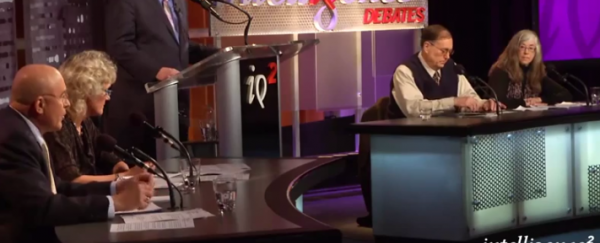As humans, we've been eating genetically modified (GM) foods for decades. The practice involves altering the genetic make-up of one organism by introducing certain genes from another to produce one or more desired traits. Generically modified traits such as pest, drought, and rust resistance; better flavour; and higher yield are commonly found in our food and the food we give to our farm animals.
And yet, it's an incredibly controversial issue that often polarises the people who are fine with GMOs and those who are not. So what better topic to hold a public debate on?
Run by Intelligence Squared, which is an organisation founded in London to bring debate and intelligent discussion to interested public around the world, the GMO debate was carried out in New York City's Kaufman Centre last Friday by four US-based researchers.
On the 'for' side were animal Genomics and biotechnology expert, Alison Van Eenennaam from the University of California, Davis, and Monsanto chief technology officer, Robert Fraley. On the 'against' side were Charles Benbrook, a research professor from the Centre for Sustaining Agriculture and Natural Resources at Washington State University, and Margaret Mellon, director of the Agricultural and Biotechnology Program of the Union of Concerned Scientists in Washington, DC.
While it's easy to pick out Fraley as having, quite literally, a vested interest in the outcome of the debate, he was held to the same standards of evidence as the rest of the debaters on issues such as are they safe? How do they impact the environment? Can they improve food security? And is the world better off with or without GM food?
Before the debate, the 450-strong audience was asked to vote for or against the practice of genetically engineering food crops, with 32 percent saying they were 'for', 30 percent saying they were against, and 38 percent were undecided. "In the end, 31 percent were against—and 60 percent were for, a gain of 28 percentage points," Popular Science reports. "The average wining margin in the last 10 Intelligence Squared US debates was around 18 percentage points. The final vote also contrasts with what national polls say about how Americans feel about GM foods."
What's becoming increasingly clear in the debate over GMOs is that it's essentially insolvable - one side says there's no evidence to suggest that any genetically modified food is dangerous, and the other says "What if something we can't see now finally becomes apparent in 50 years time, when it's too late?" Do we put down the tools available to us - that could be the only answer to solving, and mitigating, increasing world hunger - because we don't know what will happen in the future, or do we keep going and work harder to ensure that regulatory bodies and independent research continue to be vigorous and thorough?
"The 'for' people were just so much more on point than the 'against' people," American scientist and science communicator Bill Nye told Popular Science after the show. During the debate, Nye asked a question about how we can know what genetically modified crops are doing to the environment if we haven't had a long-enough time frame to study their effects. "I'm still not satisfied, as a scientist, as a voter, that five years is enough," he said, but, "The GMO people were much better spoken."
Watch the 90-minute debate above and see how your vote would change. Another good resource on the debate is this piece by David H. Freedman for Scientific American. This isn't one that's going to be solved for a long time, I suspect.
Source: Popular Science
